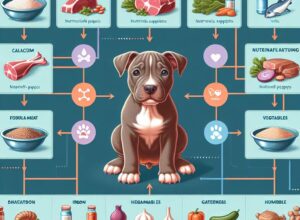
Article-at-a-Glance
| Quick Facts |
|---|
| Magnesium is a crucial mineral for your pitbull puppy’s overall health and development. |
| Signs of magnesium deficiency can include weakness, loss of appetite, and abnormal heart rhythms. |
| Causes of deficiency range from poor diet to underlying health issues. |
| Consulting with a vet and possibly adjusting your puppy’s diet are key steps to addressing the deficiency. |
| Preventative measures include regular dietary reviews and ensuring a balanced intake of nutrients. |
Key Takeaways
- Magnesium is vital for muscle and nerve function, as well as bone health in pitbull puppies.
- Early detection of magnesium deficiency is crucial to prevent long-term health issues.
- A balanced diet is the cornerstone of preventing and treating magnesium deficiency.
- Regular vet check-ups are essential for monitoring your puppy’s magnesium levels.
- Home care, including proper nutrition and hydration, plays a significant role in maintaining your puppy’s health.
Magnesium’s Role in Your Pitbull Puppy’s Health
Think of magnesium as the unsung hero in your pitbull puppy’s diet. This mineral might not get the spotlight like protein or calcium often do, but it’s just as crucial for your furry friend’s well-being. Magnesium aids in over 300 enzymatic processes in the body, supports a healthy immune system, and helps keep bones strong. It’s also key for muscle and nerve function, which means it’s essential for your pup’s everyday actions from walking to wagging their tail.
Why Magnesium is Essential
Without enough magnesium, your pitbull puppy could face a host of health issues. It’s not just about strong bones and teeth; magnesium also regulates muscle contractions and keeps the heart rhythm steady. It even plays a role in producing energy and synthesizing proteins. Simply put, magnesium is a building block for your puppy’s health, and without it, their body can’t function optimally.
But how do you know if your pitbull puppy is getting enough magnesium? It’s all in the diet. Puppies, especially of larger breeds like pitbulls, have unique nutritional needs that must be met for them to grow up healthy and strong. This includes a careful balance of minerals like magnesium, which is found in foods like green leafy vegetables, nuts, and whole grains.
Recognizing a Deficient Diet
A magnesium-deficient diet can be more common than you think, especially with the prevalence of processed pet foods that may lack essential nutrients. If your puppy’s diet isn’t varied enough or if they’re eating lower-quality foods, they might not be getting the magnesium they need. It’s crucial to read the labels on pet food and understand what goes into your pitbull’s diet.
But it’s not just about the quantity of magnesium; absorption matters too. Factors like the presence of other nutrients, such as calcium and phosphorus, can affect how well magnesium is absorbed in your puppy’s body. So, it’s not just what you feed your pitbull, but also how you combine those nutrients that counts.
Detecting Magnesium Deficiency: Key Signs to Watch For
Spotting the signs of magnesium deficiency early on can save your pitbull puppy from discomfort and more severe health complications. Watch for changes in their behavior or physical condition that seem out of the ordinary. If your puppy seems less energetic, has a decreased appetite, or is showing signs of discomfort, it’s time to take a closer look.
More specific signs of magnesium deficiency can include muscle tremors, spasms, or seizures, which are particularly alarming. In some cases, a deficiency can lead to an abnormal heart rhythm, known as arrhythmia, which can be detected by your vet. Remember, these symptoms can also be indicative of other health issues, so it’s important to consult a professional for an accurate diagnosis.
Being proactive about your pitbull puppy’s nutrition isn’t just about avoiding problems; it’s about giving them the best start in life. By keeping an eye out for the signs of magnesium deficiency and understanding its importance in your puppy’s diet, you’re setting the stage for a happy, healthy adulthood.
Physical Symptoms and Behavioral Changes
Physical symptoms of magnesium deficiency in your pitbull puppy can range from subtle to severe. One of the first things you might notice is a general sense of lethargy. Your normally playful pup may seem less interested in their usual activities. Muscle weakness is another tell-tale sign, which might make them appear unsteady on their feet. In more serious cases, you could observe muscle twitches or spasms, which should not be ignored.
Behavioral changes often accompany these physical symptoms. If your puppy is normally a voracious eater but suddenly turns their nose up at mealtime, it could be a sign that something is off. Additionally, if they seem more irritable or have difficulty focusing during training sessions, these could also be subtle hints of a magnesium deficiency. Paying attention to these changes is crucial for early intervention.
When to Seek a Vet Consultation
If you’re noticing any of the symptoms mentioned above, it’s time to consult with your vet. Magnesium deficiency isn’t something to take lightly, and a professional can help you determine the severity of the issue and the best course of action. This is especially important because the symptoms of magnesium deficiency can mimic those of other conditions, making it challenging to diagnose without a vet’s expertise.
Your vet may perform blood tests to measure your puppy’s magnesium levels along with other important electrolytes. They can also assess your puppy’s overall health to rule out other potential causes of the symptoms you’re observing. Remember, prompt veterinary attention can make all the difference in managing your puppy’s health.
Investigating the Cause: Why Your Puppy May Be Deficient
Understanding why your pitbull puppy is deficient in magnesium is key to preventing future health issues. While a poor diet is a common culprit, there are other factors that can contribute to a deficiency. It’s important to look at the big picture of your puppy’s health and lifestyle to pinpoint the cause.
Dietary Imbalances and Poor Absorption
A diet that lacks variety or is heavy on processed foods may not provide enough magnesium. But even with a magnesium-rich diet, if your puppy has issues with digestion or absorption, they might not be getting the full benefit of the nutrients you’re providing. Factors like an imbalance of other minerals, such as calcium, can interfere with how well magnesium is absorbed.
Ensuring your puppy’s diet is not only rich in magnesium but also balanced with other essential nutrients is critical. This might involve feeding a combination of high-quality commercial foods, raw diets, or home-cooked meals, always under the guidance of a vet or a canine nutritionist.
Underlying Health Conditions
Sometimes, an underlying health condition could be at the root of your puppy’s magnesium deficiency. Issues with the kidneys, which help regulate magnesium levels in the body, can lead to a deficiency. Certain genetic conditions may also affect how your puppy processes and utilizes magnesium.
If your vet suspects an underlying health issue, they might recommend additional testing or refer you to a specialist. It’s essential to follow through with these recommendations to get to the bottom of the deficiency and to ensure your puppy’s long-term health.
Reversing the Trend: Effective Solutions for Magnesium Deficiency
Addressing magnesium deficiency in your pitbull puppy involves a multifaceted approach. The good news is that with the right strategies, you can reverse the deficiency and help your puppy thrive.
The first step is to review and adjust your puppy’s diet. This might mean switching to a higher-quality food that’s formulated to meet the nutritional needs of growing puppies. Your vet might also suggest adding specific foods that are high in magnesium, such as leafy greens or fish, to your puppy’s meals.
In some cases, dietary changes alone may not be enough, and your vet may recommend a magnesium supplement. It’s crucial to use supplements under veterinary supervision because the wrong dosage can cause more harm than good. Your vet will guide you on the appropriate type and amount of supplement to use for your pitbull puppy.
Regular follow-ups with your vet are also important to monitor your puppy’s magnesium levels and adjust the treatment plan as needed. With these steps, you can help ensure your pitbull puppy gets back on track to a healthy, energetic life.
Adjusting Your Puppy’s Diet with Vets’ Recommendations
When it comes to your pitbull puppy’s diet, your vet’s advice is invaluable. They can suggest specific foods that will boost magnesium intake naturally. This might include incorporating more fish, like salmon or mackerel, which are not only rich in magnesium but also provide essential omega-3 fatty acids for healthy skin and coat. Green leafy vegetables like spinach can be another good source, as well as seeds and whole grains.
It’s not just about adding magnesium-rich foods; it’s also about ensuring a balanced diet. Your vet may recommend reducing or balancing the intake of other minerals, such as calcium, which can compete with magnesium for absorption. The goal is to create a diet that meets all of your puppy’s nutritional needs without inadvertently causing imbalances.
Remember, any dietary changes should be introduced gradually to avoid upsetting your puppy’s stomach. A slow transition over several days or even weeks is best, allowing your puppy’s digestive system to adjust. Your vet can provide a tailored plan to ensure the transition is smooth and beneficial.
Supplements: Types and Proper Usage
If your vet determines that your puppy’s diet alone isn’t enough to correct their magnesium deficiency, they may suggest a supplement. There are various types of magnesium supplements available, including oral tablets, powders, and liquids. Each has its own advantages and usage instructions, which your vet will explain.
It’s crucial to follow your vet’s recommendations closely when it comes to dosage and frequency. Too much magnesium can lead to adverse effects, so precision is key. Supplements should also be given with food to improve absorption and minimize the risk of digestive upset.
Keep in mind that not all supplements are created equal. Quality matters, and your vet can recommend a reputable brand that’s safe and effective for your puppy. With the right supplement and proper usage, you can help correct your puppy’s magnesium deficiency and support their overall health.
Maintaining the Balance: Long-Term Strategies
Regular Dietary Reviews
As your pitbull puppy grows, their nutritional needs will change. Regularly reviewing their diet with your vet ensures that they’re getting the right balance of nutrients, including magnesium. This might involve adjusting portion sizes, introducing new foods, or even changing their diet as they transition from puppyhood to adulthood.
It’s also important to be mindful of how treats and extras fit into your puppy’s overall diet. While treats are a great training tool, they should be given in moderation and chosen carefully to avoid disrupting the nutritional balance of your puppy’s meals.
Staying informed about the latest in canine nutrition can also help you make the best choices for your pitbull puppy. Whether it’s reading up on new research or attending workshops, your commitment to learning will benefit your furry friend’s long-term health.
Follow-Up: Monitoring Your Puppy’s Magnesium Levels
After addressing a magnesium deficiency, it’s important to keep an eye on your puppy’s levels. Your vet may recommend regular blood tests to monitor magnesium and ensure that it remains within a healthy range. These check-ups are also an opportunity to assess overall health and catch any other potential issues early.
Monitoring doesn’t end at the vet’s office, though. Keep an eye on your puppy’s energy levels, appetite, and behavior at home. If you notice any changes that concern you, don’t hesitate to reach out to your vet. They’re your partner in your puppy’s health journey.
Home Care Tips: Ensuring Adequate Magnesium Intake
Taking an active role in your pitbull puppy’s nutrition doesn’t have to be complicated. Here are some simple home care tips to help ensure they’re getting enough magnesium:
- Balance the Bowl: Aim for a well-rounded diet that includes a variety of nutrient-rich foods.
- Read and Understand Labels: Know what’s in your puppy’s food and choose products with high-quality ingredients.
- Hydration is Key: Fresh water aids in nutrient absorption, so make sure your puppy has access to clean water at all times.
- Homemade Help: Consider preparing homemade meals or adding fresh foods to your puppy’s diet, but always consult with your vet first.
- Supplement Smart: If using supplements, choose high-quality brands and stick to the vet-recommended dosage.
By following these tips and maintaining open communication with your vet, you can play a crucial role in preventing and managing magnesium deficiency in your pitbull puppy. Your efforts will help pave the way for a healthy, happy life for your four-legged companion.
Homemade Meals and Safe Ingredients
Creating homemade meals for your pitbull puppy can be a rewarding way to cater to their nutritional needs, including magnesium intake. Start with safe, wholesome ingredients like lean meats, fish, and a variety of vegetables. Spinach, for example, is not only a leafy green high in magnesium but also rich in iron and fiber.
When preparing homemade meals, it’s essential to consult with your vet or a canine nutritionist to ensure the meals are nutritionally balanced. They can help you design recipes that include the right proportions of protein, carbohydrates, fats, and essential vitamins and minerals. Remember, variety is key to covering the spectrum of nutrients your puppy needs.
Always cook the ingredients thoroughly to prevent any foodborne illnesses and avoid using any seasonings or ingredients that are toxic to dogs, such as onions, garlic, and excessive salt. Introduce new foods gradually to monitor for any adverse reactions and to allow your puppy’s digestive system to adjust.
Keeping Your Puppy Hydrated
Hydration is just as important as nutrition when it comes to your puppy’s health. Adequate water intake is crucial for magnesium and other nutrient absorption. Ensure your pitbull puppy has constant access to fresh, clean water. Change it frequently throughout the day to encourage them to drink regularly.
Be mindful of your puppy’s activity level and the weather, as these factors can influence their hydration needs. Puppies that are more active or exposed to hot climates may need more water. If you’re unsure about how much water your puppy should be drinking, consult your vet for guidance.
Remember, while milk and broths can provide additional hydration, water should be the primary source of fluids for your puppy. Avoid giving them caffeinated beverages or anything containing artificial sweeteners, which can be harmful to their health.
Frequently Asked Questions (FAQ)
How can I tell if my pitbull puppy is magnesium deficient?
Identifying magnesium deficiency in your pitbull puppy involves watching for certain signs and symptoms. Look for changes in behavior such as lethargy, reduced appetite, and signs of discomfort. Physically, you may notice muscle weakness, tremors, or spasms. If your puppy experiences seizures or abnormal heart rhythms, these are serious signs that require immediate veterinary attention.
Keep in mind that these symptoms can also be indicative of other health issues, so it’s crucial to get a professional diagnosis. Your vet can conduct a blood test to determine your puppy’s magnesium levels and rule out other potential causes.
What foods are high in magnesium for puppies?
Several foods can boost your puppy’s magnesium intake naturally. These include:
- Green leafy vegetables like spinach and kale
- Fish, particularly salmon and mackerel
- Seeds, such as pumpkin and chia seeds
- Whole grains like brown rice and quinoa
- Beans and legumes
Integrating these foods into your puppy’s diet can help ensure they receive adequate magnesium. Always introduce new foods gradually and in moderation, and consult with your vet to ensure these foods are appropriate for your puppy’s specific dietary needs.
Are there any risks associated with giving my puppy magnesium supplements?
While magnesium supplements can be beneficial for puppies with a deficiency, there are risks associated with improper use. Excessive magnesium can lead to digestive upset, including diarrhea, and more serious issues like urinary problems or heart issues. It’s essential to only use supplements under the guidance of a vet who can prescribe the correct dosage and monitor your puppy’s response.
Additionally, not all supplements are created equal. The quality and formulation of the supplement are important factors to consider. Your vet can recommend reputable brands and forms of magnesium that are safe and effective for your puppy’s unique needs.
Always follow your vet’s instructions carefully when administering supplements and report any adverse reactions immediately. With the right approach, supplements can be a safe and effective way to address magnesium deficiency in your pitbull puppy.
How often should my puppy’s magnesium levels be checked?
Keeping tabs on your pitbull puppy’s magnesium levels is a proactive step towards ensuring their health. The frequency of these checks can depend on several factors, including their overall health, diet, and any previous issues with magnesium deficiency. Typically, your vet may recommend checking their levels during regular wellness visits, which might be once or twice a year. However, if your puppy has had a history of deficiency or shows signs of health issues, your vet might suggest more frequent testing.
It’s important to work with your vet to establish a schedule that’s right for your puppy. Regular testing can help catch any imbalances early and adjust their diet or supplements as needed. Remember, consistent monitoring is key to maintaining your puppy’s health and well-being.
Can magnesium deficiency affect my puppy’s long-term health?
Magnesium deficiency, if left unchecked, can indeed have long-term effects on your pitbull puppy’s health. Chronic deficiency can lead to persistent health issues, such as poor bone development, heart problems, and chronic muscle weakness. These issues can affect your puppy’s quality of life and may lead to more serious health complications as they grow older.
However, with early detection and proper management, you can prevent these long-term effects. A balanced diet, regular vet check-ups, and appropriate supplementation can correct a deficiency and help maintain your puppy’s health throughout their life. Your vigilance and care can make a world of difference in your puppy’s future well-being.
In conclusion, magnesium plays an essential role in your pitbull puppy’s health, and it’s important to ensure they receive an adequate amount through their diet. Recognizing the signs of magnesium deficiency and understanding the causes are the first steps in protecting your puppy’s health. With the right diet, possible supplementation, and regular veterinary care, you can manage and prevent magnesium deficiency, setting your pitbull up for a healthy, vibrant life.
Remember, your commitment to your puppy’s nutrition is a testament to the love and care you have for your furry companion. By staying informed and proactive about their dietary needs, you’re not just feeding them; you’re nurturing their growth and vitality. Your pitbull puppy depends on you for their well-being, and with the guidance provided in this article, you’re well-equipped to ensure they thrive.



